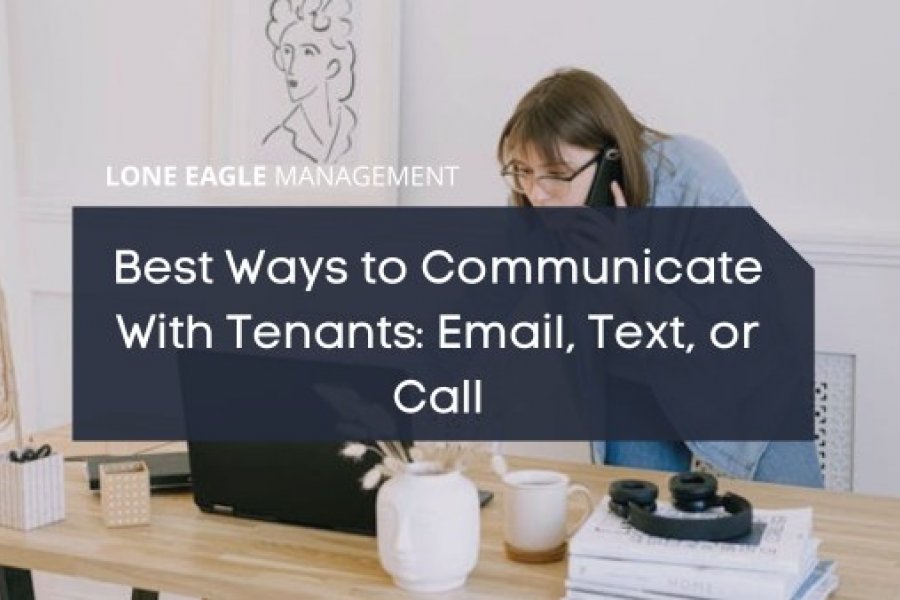
- Clear Channels Improve Tenant Communication: Using the right method for the message helps ensure tenants receive and respond to important updates.
- Mismatched Messaging Creates Confusion: Sending sensitive or detailed information through the wrong channel can lead to misunderstandings and frustration.
- Adaptable Communication Builds Stronger Relationships: Adjusting your communication style based on the situation and tenant preferences helps maintain trust and professionalism.
At Lone Eagle Management, we understand that landlords today have more communication tools at their fingertips than ever before.
From emails and text messages to dedicated tenant portals and mobile apps, technology has completely transformed how landlords and tenants interact. Real-time updates, faster responses, and more accessible information have all made it easier to stay connected and responsive.
But with these advancements come new complexities. Not every tenant communicates the same way, and preferences can vary widely. Some tenants may appreciate a quick text message, while others expect formal notices via email or prefer to speak directly by phone.
Understanding when and how to use each channel is a key part of building trust, avoiding misunderstandings, and maintaining a strong landlord-tenant relationship through professional, respectful communication.
As a landlord, your ability to adapt your communication style to suit the situation can directly impact tenant satisfaction, lease renewals, and even compliance with local regulations. That’s why it’s so important to take a thoughtful, strategic approach.
In the guide below, we break down the most common communication methods and explain when each one is most effective.
Learn How We Can Help You Maximize Your Home’s Potential!
Phone Calls
Outbound calls may be necessary for certain situations, where live conversations may be necessary. The following are some examples of situations where you may want to prioritize phone calls over other communication channels:
- When you want to communicate with your tenant about an urgent issue, such as a disaster recovery plan.
- When looking to make a courtesy reminder about things like late rent payments or lease violations.
- When seeking clarity or additional information regarding an issue. In such a case, back-and-forth information via text or email on complex matters may not be suitable.

Best Practices for Phone Communication
When calling a tenant, keep these guidelines in mind:
- Begin the conversation by stating your name and the reason for the call. The goal here is to ensure utmost professionalism. You’ll want to avoid being too familiar, overtly friendly, or chatty.
- If your call goes unanswered, make sure to leave a detailed voicemail. Begin by introducing yourself and let the tenant know the purpose of the call. Simply saying, “Please call me back” won’t provide any clarity. Neither will it increase the likelihood of the tenant calling you back.
- Communicate with a friendly tone. Don’t come off as passive-aggressive; rather, be personable and ensure good customer service. After all, property management is in the service industry niche. How you communicate with a tenant can determine your success.
- Be concious when you make that call. Ideally, you’ll want to stay compliant with the FCC guidelines when calling the tenant. Including calling only during normal business hours.
Discover More About Lone Eagle Management!
Emails
This is also another convenient way you can use to communicate with a tenant. Ideally, emails are best for the following purposes:
- When looking to share visual information with your tenants. These can include things like pictures, infographics, and graphics.
- When looking to send the tenant automated reminders for things like due rent amounts, invoices, or added charges.
- When you want to convey information quickly. For example, a new policy or procedure.
- When looking to store important documentation. With emails, you can get a date- and time-stamped record of all information you’ve had with the tenant.

Best Practices for Email Communication
When using email to reach tenants:
- Write detailed and coherent emails that communicate a purpose or seek information from the tenant.
- Include your contact information in the email.
- If attaching a document, make sure to double-check it before hitting the “send button”.
- Keep FCC guidelines in mind when sending the email. Only schedule the email to go out during normal business hours.
Discover Our Property Maintenance Services!
Text Messages
The other convenient communication tool you can use is text messaging. The following are some reasons to choose this communication channel instead of phone calls or emails:
- They have incredibly high open rates, so you can be sure the tenant will read the message. What’s more, unlike with emails and phone calls, the tenant won’t say the email went to the spam folder or that they missed your call.
- The response rate with text messages is high.
- Text messages don’t require smartphones. Even if your tenant is using a feature phone, you can rest assured that they will receive the text.
Best Practices for Text Messaging
To use texting effectively:
- Seek the tenant’s permission. Ideally, require this permission through the lease agreement.
- Let the tenant know what type of information they can expect through text messaging. You can limit texts to things like maintenance reminders, rent due dates, and repair updates.
- Let the tenant know what information they can relay to you via text messaging.

Bottom Line
Knowing the right communication channel to use with your tenant is essential to a smooth landlording experience. And always make sure that you have mentioned them in the lease so the tenant knows what to expect.
If you have more questions or need the help of a property manager, look no further than Lone Eagle Management. You can count on us for professional full-service property management services in Morris County, Union County, Bergen County, and Somerset County.
Our goal is to help investment property owners reduce stress and maximize their income. Get in touch to learn more!